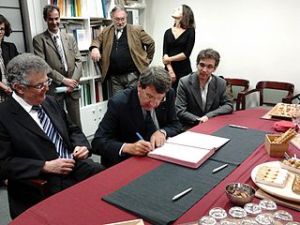
In mid June, Rémi Mathis, chairman of Wikimédia France, signed a partnership with the Agence Universitaire de la Francophonie (Association of Universities of the Francophonie – AUF) and the Institut Français (IF) to support a project called Afripedia. This initiative supports the development of Internet access in countries where, for now, the network is not stable and affordable enough. In French-speaking Africa, where most people have limited, expensive and poor quality access to the Internet, the goal is to encourage contribution and access to free knowledge. Wikimédia France intends to support future local contributor communities to move Wikipedia forward in French and in local languages.
The partnership is facilitated by the work of Kiwix developers, who for several years have been facilitating offline versions of Wikipedia in various languages. Utilizing the Kiwix platform, content from Wikipedias in different languages can be downloaded and shared all over the world to be used in diverse ways.
For Afripedia, Wikimédia France –working with Kiwix, the AUF and IF — will establish offline WiFi systems in areas where internet is not prevalent. The system essentially works like an Intranet. We will install small computers (Plug Computers) without screens or keyboards, which are very energy-efficient. Then we will connect a flash drive with the content of Wikipedia (and maybe other Wikimedia projects, like Wiktionary, etc.) and all the content will be shared by WiFi with all the computers that receive the WiFi network. To update content, you just have to update the original flash drive and every computer will receive the new information. We think that this system is better than the traditional sharing of content with flash drives or DVD, because it allows for easier and more accessible updates.
In a lot of countries, the AUF has a network of digital campuses near universities. We are in partnership with the AUF in order to benefit from that network and logistical help. We will start by setting up the project in about 20 universities in 15 countries in West-Africa and by training the staff to use Wikipedia, especially for educational use.
But we also want to encourage contribution by African people on African topics, given that there is too little coverage of those on Wikipedia. For this purpose, while we develop the offline dissemination of Wikipedia, we will organize tutorials and workshops to make it easier to contribute and collaborate with the Wikipedia community. With this training, we’re hopeful users will be able to contribute more easily when their internet connection allows them to do so.
If the project goes well, we intend to develop it further in 2013 with help from the AUF and IF. We’re starting with universities, but we can consider sharing Wikipedia content this way in schools, cultural centers and even (with wireless repeaters) in residential areas and villages.
This is a particular and unique experience for us to take part to this kind of project. It is very interesting to work with institutions with extensive experience in educationnal and cultural development. Since we have announced this partnership, and based on coverage in African media outlets, we have received several contacts from associations or people involved in cultural development. This should allow us to support new communities of contributors (and maybe future wikimedia chapters?) in these countries.
We look forward to updating you on our progress as the initiative proceeds.
Adrienne Alix, Director of programs, Wikimédia France

Can you help us translate this article?
In order for this article to reach as many people as possible we would like your help. Can you translate this article to get the message out?
Start translation